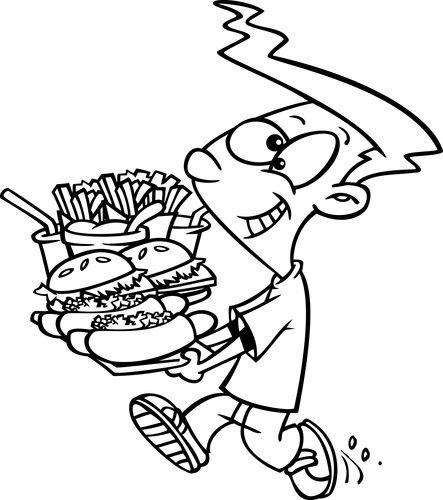Teenage boys are hungry. They eat a lot of food. And, it turns out, according to research reported in The New York Times, teenage boys eat too much protein. What do the experts recommend?
 Source: ronleishman/depositphotos.comThe answer probably won’t surprise you. Teenage boys, like the rest of us, should eat more fruits and vegetables. Read The New York Times article
Source: ronleishman/depositphotos.comThe answer probably won’t surprise you. Teenage boys, like the rest of us, should eat more fruits and vegetables. Read The New York Times article
Last week I wrote about the Early Protein Hypothesis, which tries to explain the relationship between high protein intake in toddlers and later—at age 5— BMI and obesity risk. Read that post.
Most young children get more than enough protein from milk. Children 1-3 years old need about 13 grams of protein daily. Milk and yogurt contain 8 grams of protein per cup. Two cups=16 grams of protein.
So here’s the question: Should parents avoid giving their kids protein if they’re drinking milk?
Let me start by saying that I hate talking about food in terms of nutrients. It’s a reductionist approach that doesn’t usually help parents figure out how to feed their kids. It’s the whole diet that matters and the overall pattern of eating that influences health.
Many, if not most, families enjoy other sources of protein–like meat and fish. So, that would lead to the conclusion that when/if your children are going to eat these foods, maybe less milk should be in their diet.
However, trying to pay attention to how much milk, how much meat, or how much anything your kids consume doesn’t really work on a daily basis. No one really does it. And that’s understandable.
Here’s another way of thinking about this. Instead of worrying about protein (or consumption of any other nutrient), think about proportion. What foods dominate your kids’ diets? The answer should be fruits and vegetables.
That’s not to say that there isn’t a place for everything else. Of course there is.
After proportion, work on variety. Variety means different not new. Make sure you serve different foods day-to-day and meal-to-meal.
The combination of proportion and variety produces a healthy diet.
Habits matter. Similarly, if you replace protein with pasta (not a good idea) that habit matters too.
A few years ago, I wrote a post called The Snack as Mini-Meal Mistake. I argued that, rather than think of snacks as mini-meals, which often leads kids, at least where I live to snack on things like pizza, parents should teach their kids that fruits and vegetables are the go-to snack. Not every day, but most of the time.
I got a lot of pushback, especially from parents who were raising boys. They’re too hungry, I was told. And I get it. Protein is much more filling than fruits and vegetables. But I’m not alone in this recommendation.
Dr. Perri Klass, the author of The New York Times article, recommends that teenage boys consume fiber-rich foods. And Dr. Marion Nestle is quoted as saying that teenagers should get more calories from vegetables, and fewer calories from meat.
Of course, teenage boys don’t just eat large quantities of protein because it is filling. Some do it to bulk up. But that can be problematic too. The body can only absorb so much protein, but it can absorb all those extra calories just fine.
But getting mired in the argument about individual nutrients misses the point. I agree with Marion Nestle when she says, “To me, protein is a nonissue. You can’t talk about protein in isolation from everything else people eat.”
And that’s the point. So stop stressing about nutrients and start thinking about the whole diet — about habits. Because, as these studies show, habits developed early in life, tend to stick around.
~Changing the conversation from nutrition to habits.~
(c) Its Not About Nutrition – Read entire story here.